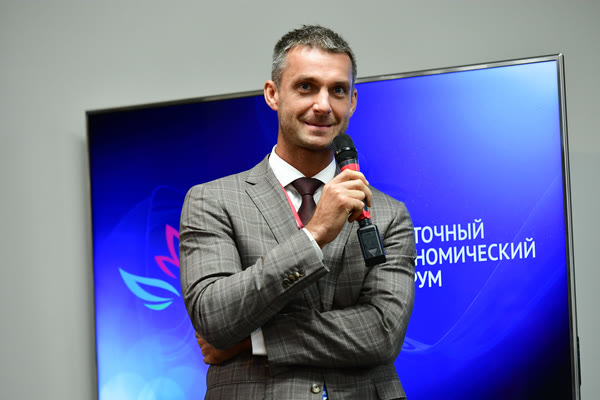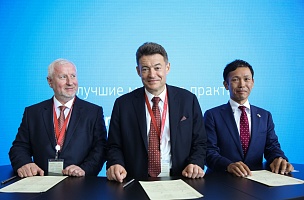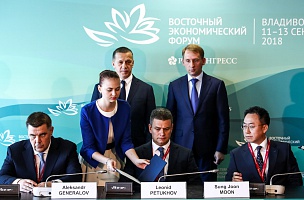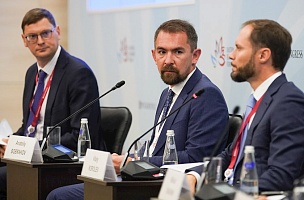KEY CONCLUSIONS
Modern technology allows IT companies to grow freely in the Russian Far East
“Earlier this year, on the basis of the Sakhalin University, there was an initiative to create a multimodal university which would collaborate with Russia’s ten largest universities, in order to provide easy access to good education. So that students would not have to travel to Moscow or other regions to gain access to it,” Rustam Milanov, Chief Executive Officer, Visitech.
“All these programmes have been launched, the selection of projects is going full speed; the Innovations Fund and Skolkovo – everything has been launched now. This is the moment for people to work on their applications, apply and win – remotely and without paperwork. No matter where they are,” Maxim Parshin, Deputy Minister of Digital Development, Communications and Mass Media of the Russian Federation.
PROBLEMS
Shortage of personnel and investment for the startups in the Russian Far East
“Of course, there is a problem with human resources in the Far East. There is a shortage of angel investors, and it was especially problematic when we started. There were virtually no benefits for startups at the time; there are not too many of them even now,” Rustam Milanov, Chief Executive Officer, Visitech.
“Indeed, the problem of underfunded projects in the Far East, especially early-stage projects, does exist. Just as an example: last year and the year before last, only 3% of venture capital investments in Russia were made in the Far East. Only the Caucasus region accounts for less: this number is near 0% there. Even though we have large industrial cities and major regional centres here,” Ruslan Sarkisov, Chief Executive Officer, Far East High Technologies Fund.
“As a private enterprise, we are probably more flexible in some ways. That means, we can fill in this niche of support for startups at an early stage, when, perhaps, the risk is bigger; but, as I have already noted, with our experience and our understanding of the market, we can do it,” Sergey Batekhin, Chief Executive Officer, Head of the Management Board, Interros.
The issue of balancing support for stronger and weaker IT companies is very acute in the region
“There is rather sizeable support at the federal level for the regions. It aims to support all regions equally, but, as we know, there is feedback, which is a negative factor in this case. Specifically, if the IT base in a certain region is strong enough and many startups are based there, they are more likely to gain this support. They gain more, and hence they expand their community and become even stronger. So, it turns out that powerful hubs become stronger, while the weaker ones gradually decline, as the resources flow into the stronger ones,” Tagir Aushev, Head of the Laboratory of High Energy Physics, Moscow Institute of Physics and Technology.
“To help the weak ones or the strong ones? To strengthen the weak ones or to make the strong ones stronger yet? These questions are quite rhetorical. I personally believe that the strong ones should get help. For sure, we must bet on the leaders so that the strong ones become even stronger,” Maxim Parshin, Deputy Minister of Digital Development, Communications and Mass Media of the Russian Federation.
“The question of whether to provide support for the stronger ones or not. It seems to me that it is not exactly the right way to put it, because I said at some point: “Okay, we do this on our own.” Everything that has been done in Yakutia, has been done by the regional government. Now, if we take Yuzhno-Sakhalinsk for example, perhaps their starting point is low, but their team in the regional authorities is very strong. I have a feeling that we need to support Yuzhno-Sakhalinsk now, because right now they have potential for growth,” Anatoly Semenov, Minister of Innovations, Digital Development and Communication Technologies of the Republic of Sakha (Yakutia).
SOLUTIONS
IT companies in the region should focus on the Asia-Pacific market
“There are vast advantages in the Far East: first of all, the environment is good, labor is inexpensive in comparison with Moscow, and workforce can be trained quickly. This is the pool of opportunities that we have in the Far East, so that we could get a chance for a breakout and focus on the Asia-Pacific region,” Rustam Milanov, Chief Executive Officer, Visitech.
“Many of our companies are entering the Western markets, where the mentality is easier to understand. The Chinese market is especially interesting and promising for us,” Tagir Aushev, Head of the Laboratory of High Energy Physics, Moscow Institute of Physics and Technology.
Regional teams in the IT sphere should be organized
“I believe that the skills should be trained within the region. It is not really up to the Digital Development Ministry. It depends on teamwork, it largely depends on the regional teams,” Anatoly Semenov, Minister of Innovations, Digital Development and Communication Technologies of the Republic of Sakha (Yakutia).
“If the region wants strong human resources, so that the bright individuals who were born and raised in the region would stay there, the investing in IT development in the region – the IT specialists and IT companies – is an obvious move right now. The pandemic clearly proved it,” Ivan Kolomoyets, Co-Founder, Uchi.ru.
For more information, visit the ROSCONGRESS.ORG Information and Analytical System






